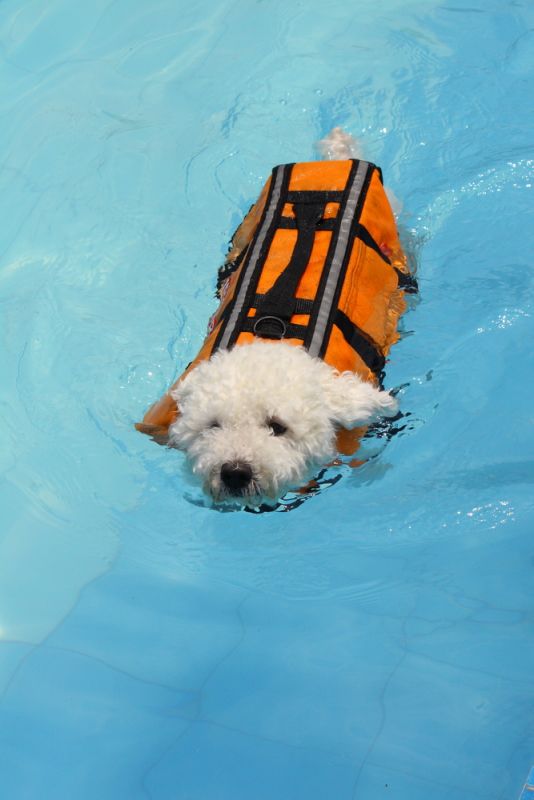
With climbing temperatures and sunny days already upon us, summer is right around the corner. In order to cool off, people and pets alike can be found jumping into pools, lakes and oceans. Swimming is great exercise for pets – it’s something that we highly recommend especially for furry friends with arthritis or joint issues, as it doesn’t require weight bearing. It’s important to be aware that even the most adept and enthusiastic of swimmers can run into problems – here we review the most important things to be aware of when swimming.
Although some dogs will pick up swimming naturally, it’s important to know that not all dogs are natural swimmers. There will be many dog breeds that will probably never be comfortable or happy swimming, such as French and English Bulldogs and other flat nosed breeds. If it’s your pet’s first time, it’s important to introduce them slowly and gradually to water. Keep each session short and start off with a body of calm, shallow water where they can gradually wade in to a level where they feel comfortable.
Always supervise your pet when swimming. Pets will eventually get tired and may not realize that they can only easily exit from one side of the pool. Older pets that were strong swimmers when they were younger will get tired more easily and may not realize their limits.
When boating or if you are not confident in your pet’s swimming ability, have them wear a canine life vest. Often these have handles that allow you to pull the dog up and out of the water if they are unable to get out themselves.
After each swimming session, be sure to clean out your pet’s ears. Too much water or moisture after a swimming session can predispose them to ear infections.
It’s important to be aware of the following risks so your pet stays safe:
Leptospirosis: Wild animals (ie. deer, raccoons, and skunks) can urinate into water sources such as rivers, lakes or streams. If that particular wild animal happens to be carrying a disease called Leptospirosis and your pet ingests the same water they urinated into, your pet can get very sick. Leptospirosis is a bacteria that can cause kidney and/or liver failure. There is a vaccine available for this. For more information please click here.
Blue-green algae: Just this year, Lake Chabot has had several cases of blue-green algae poisoning, which has called fatalities in dogs. Blue-green algae can cause liver failure and neurotoxicity. It is a rapidly progressive and often fatal toxin - we strongly recommend avoiding contact with water that is questionable.
Currents and tides can sweep your pet out to sea, be sure to check for riptides and survey the water before allowing your pet in.
Hypernatremia: When playing in or near the ocean, if your pet ingests too much salt water they can get salt toxicity or hypernatremia. If you see your pet drinking the ocean water, be sure to call them away and have them drink fresh water you’ve brought along instead. Hypernatremia can cause vomiting, diarrhea, seizures and severe brain swelling if untreated.
Swimming is great way to cool off and enjoy summer. If you take into account and prepare for the above, then it can be safe too!
Tags: swimming, pet water safety, ask your vet







